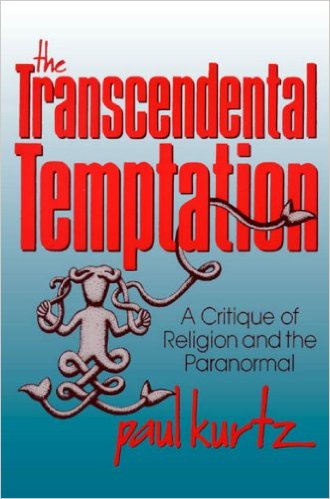BY PAUL KURTZ (PUBLISHED 1991 BY PROMETHEUS BOOKS. 500 pages)
The Transcendental Temptation is widely considered to be the late Paul Kurtz’s magnum opus. The free thought community owes a great debt to Kurtz (1925-2012), who is often called the father of modern secular humanism. A prolific author, Kurtz founded Prometheus Books in 1969 and also founded the Committee for Skeptical Inquiry, the Council for Secular Humanism, and the Center for Inquiry, which now has chapters and branches in seventeen US cities and 21 countries. He was also the editor in chief of Free Inquiry magazine and a Humanist Laureate. No other freethinker has as impressive a list of credentials as Kurtz. The Transcendental Temptation is arguably Kurtz’s greatest free thought masterpiece.
Temptation exposes the absurdities of religion, cults, and the various aspects of paranormal belief. Kurtz’s main thesis is that many people are driven by an intense desire to accept “magical” thinking as reality beyond the realm of normal sensory perception. To such people, beliefs become hardened into fact. Besides religion, these beliefs include such popular ideas as UFOs, ghosts, space aliens, and the superstition of associating future misfortune with walking under a ladder or breaking a mirror.
The preface and introduction alone are almost worth the purchase price. Here, Kurtz emphasizes the vital importance of skepticism, especially at a time when recurrent religious atrocities are seldom far from the mainstream news media. Non-critical and unschooled in history and science, many of our fellow humans tend to put reason aside and yield to the temptation of the transcendental. To those of such a mindset, this subjective “reality” is often viewed as being somehow “superior” to the real world. The danger becomes apparent when they are so obsessed with their own fantasy that they are willing to kill and die for it.
There are four sections. The first explores the scientific method and the traditional justifications for believing in the supernatural, whatever its manifestation. Section two focuses on belief in the existence of gods and examines the three major Western religions and their offshoots, including Mormonism and the Seventh Day Adventists. Section three lays bare ESP, psychics, spiritualism, astrology, and UFOs.
In section four “Beyond Religion,” Kurtz brilliantly ties everything together. Here, he connects the tricks of magicians with the revelations of priests. Of course, this “special knowledge,” to which only these supposedly “gifted” or “chosen” shamans and intermediaries are privy, allows them great control over the minds and purses of their naive followers. According to Kurtz, modern religions are merely more sophisticated manifestations of beliefs and rituals predating science and written history. Slick presentations and hairdos aside, our present-day religions are no more true than those practiced by our ancient ancestors. And all the faith in the world cannot make them true.
The Transcendental Temptation, perhaps more than any other book on free thought, effectively nails down the coffin lid on magical thinking, while demonstrating the dysfunctional and destructive nature of modern religion.

